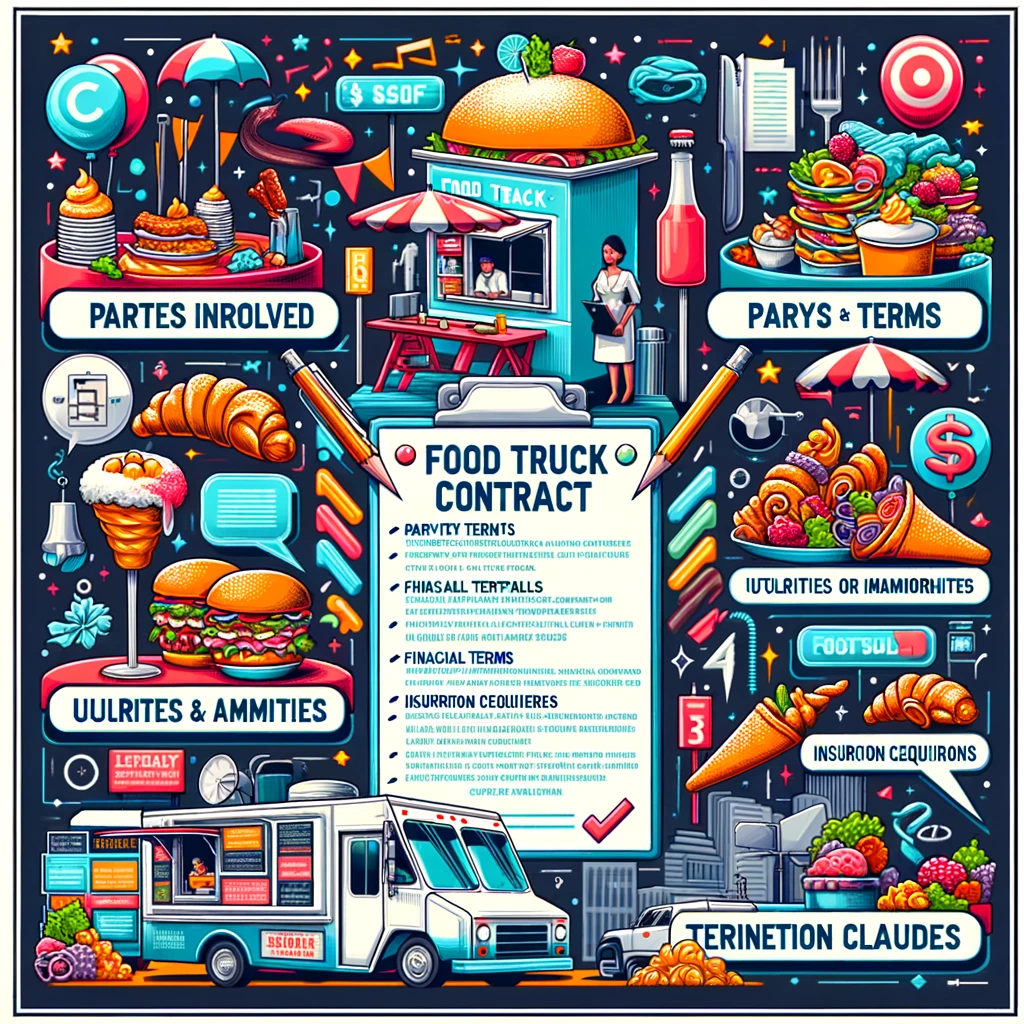Mastering Food Truck Contracts: A Comprehensive Guide for Vendors and Event Organizers
The dynamic world of food truck vending is an increasingly popular facet of the culinary scene, offering a diverse array of gourmet street food and unique dining experiences. At the heart of successful food truck operations, especially when it comes to participating in events or leasing spaces, are well-crafted food truck contracts. These agreements lay the groundwork for a mutually beneficial relationship between food truck vendors and event organizers or property owners. This comprehensive guide dives deep into the essentials of food truck contracts, underscoring their significance, key components, and legal considerations, enriched with authoritative links to enhance credibility and assist both vendors and organizers in navigating these crucial agreements effectively.

The Significance of Food Truck Contracts
Food truck contracts serve as legally binding agreements that specify the terms and conditions under which food truck vendors operate at events, festivals, or specific locations. These contracts are pivotal in clarifying expectations, detailing financial arrangements, and outlining the responsibilities and rights of both parties, thereby minimizing potential disputes and ensuring smooth operations.
Key Components of a Food Truck Contract
A robust food truck contract should address several critical elements to safeguard the interests of both the food truck vendor and the event organizer or property owner:
Parties Involved: Full identification of the food truck vendor and the event organizer or property owner, including contact information.
Event or Location Details: Description of the event or location where the food truck will operate, including dates and operating hours.
Financial Terms: Clear outline of the fee structure, including rental fees, percentage of sales payable to the organizer, deposit requirements, and payment schedules.
Menu Items: Specification of the menu items the food truck is authorized to sell, potentially including requirements or restrictions imposed by the event organizer.
Utilities and Amenities: Details regarding the provision of utilities (electricity, water, etc.), space dimensions, and any other amenities or services provided.
Licenses and Permits: Confirmation that the food truck vendor will obtain all necessary local, state, and federal licenses and permits for operation.
Insurance Requirements: Specifications of the types and amounts of insurance coverage required, including liability insurance.
Termination Clauses: Conditions under which the contract may be terminated by either party.
Legal Considerations and Compliance
Navigating the legal landscape is crucial for crafting enforceable food truck contracts. Both vendors and organizers must consider:
Local and State Regulations: Compliance with health, safety, and business regulations specific to the location where the food truck will operate. The U.S. Small Business Administration (SBA) provides resources on starting and managing food truck businesses, including regulatory considerations.
Zoning Laws: Understanding of zoning laws that govern where food trucks can operate. Local city or county government websites often contain relevant information.
Intellectual Property: Respect for intellectual property rights, especially concerning trademarks and branding.

Create & Review Your Contracts 10x Quality and Ease
Lawyer-level AI handles all your contract needs, with real lawyers providing safeguarding support

Best Practices for Drafting and Negotiating Food Truck Contracts
To ensure a fair and effective food truck contract, consider the following best practices:
Thorough Review: Both parties should carefully review all contract elements. Engaging a legal professional with experience in food service and event planning can provide valuable insights.
Flexibility and Clarity: While templates can serve as a starting point, tailor each contract to the specific event or leasing arrangement, ensuring clarity on all terms.
Dispute Resolution: Include a mechanism for resolving disputes, potentially through mediation or arbitration, to avoid litigation.
Conclusion
Food truck contracts are indispensable tools for defining the relationship between vendors and event organizers or property owners. By understanding their key components and adhering to legal requirements, parties can establish a foundation for successful collaborations. Leveraging resources such as the National Food Truck Association for industry standards and the Institute for Justice for legal advocacy can further enhance the knowledge and operation of food truck ventures.
In an industry driven by passion, creativity, and entrepreneurship, well-drafted food truck contracts ensure that logistical and legal bases are covered, allowing vendors to focus on what they do best: bringing delicious, inventive street food to the masses.

